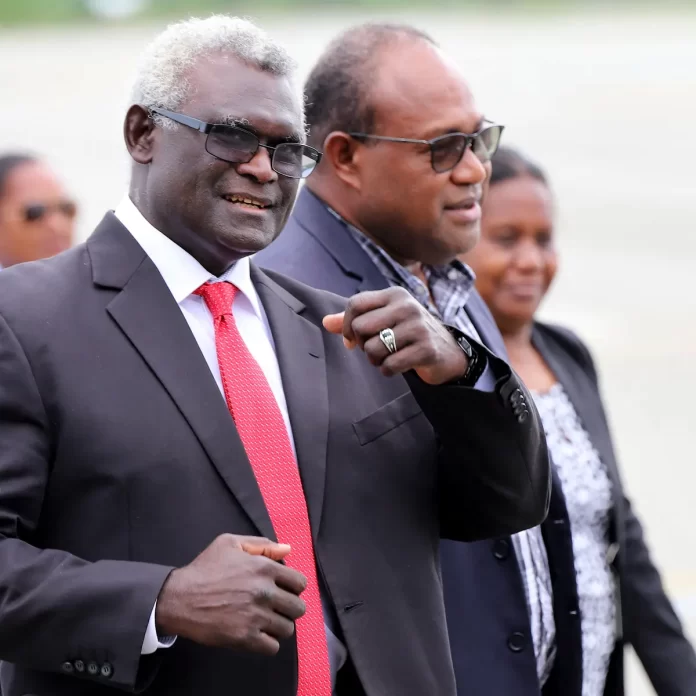-Defence Minister Richard Marles declared Australia would be “very keen” to help Solomon Islands set up its own defence force and says the Pacific Island nation of Vanuatu was also thinking about establishing a military.
Only three Pacific Island nations — Tonga, Papua New Guinea and Fiji — currently maintain standing militaries.
But Solomon Islands Prime Minister Manasseh Sogavare said on Monday that he had “sounded out” Marles about potentially setting up its own defence force when they held talks late last month in Honiara.
Sogavare has repeatedly complained about Solomon Islands’ dependence on outside forces to help maintain stability and has argued the 1,500-strong Royal Solomon Islands Police Force was too small to guarantee security.
Marles said it was a “decision for Solomon Islands” on whether it should push ahead with the idea, and that Australia would not “express a view” either way.
But he said Australia would be a “natural partner of choice” for Solomon Islands if it did decide to press ahead.
“What was indicated to me by the prime minister is that this is a path that Solomon Islands is interested in walking down,” he told the ABC.
“And in that event, Australia is very keen to play its part in partnering with Solomon Islands in the development of their defence force.
“And we have experience in terms of what we do with Fiji defence force, the PNG defence force, Tonga defence force.”
Marles also said Vanuatu was similarly “thinking about moving down this path” — although he did not provide any further details.
At the moment, Vanuatu maintains only a small “Mobile Force” that helps police maintain order, but which is meant to provide a “first line of defence against external aggression” if the country faces a military threat.
Marles suggested he wanted to ensure Australia was the country Pacific nations turned to if they wanted to expand their military capability.
“We bring a lot of experience to bear but I think the real fundamental point is that we seek to be the natural partner of choice for Solomon Islands and indeed all the countries in the Pacific,” he said.
Australia demands more transparency on Solomon Islands’ intentions.
The idea of setting up a military was likely to be deeply controversial in Solomon Islands, which was riven by ethnic turmoil from the late 1990s, when order broke down and both armed militias and police engaged in widespread crime and violence.
Armed police also launched a coup in 2000, before the Australian-led RAMSI intervention restored order in July 2003 — departing only in 2017.
Australian police and ADF personnel returned to the country in 2021 when Honiara was once again roiled by rioting and violence, and Sogavare turned to Australia for assistance to re-establish stability.
It is not the first time that Sogavare has mused publicly about the idea of setting up a military.
In 2019, he told the Little Red Podcast that one of the reasons why he wanted to switch diplomatic recognition from Taiwan to China was because Beijing would be able to help Solomon Islands stand up its own defence forces.
Security analysts said the Australian government — which was already anxious about expanding police ties between China and Solomon Islands — was determined to do everything possible to stop any military cooperation between Beijing and Honiara.
But Dr Meg Keen from the Lowy Institute said the key question for Australia was “where the best return on effort lies for the security partnership”.
“It is not clear why a military is needed in Solomon Islands, and there are not enough resources for the current police force,” she told the ABC.
“Security gaps could be filled by a better-resourced and supported police force. Law and order issues could be better addressed by investment in youth, development and economic opportunity.
“And, finally, the greatest security threat — climate change — requires strengthened disaster preparedness and response.”
Tess Newton Cain from the Griffith Asia Institute’s Pacific Hub said both governments could face deep opposition in Solomon Islands and the wider Pacific region if they pushed ahead with the plan.
“The question is whether the people of Solomon Islands think this is a good idea,” Dr Newton Cain said.
“There are huge human security and development challenges in Solomon Islands. I do not see how a military addresses the issue of a lack of adequate health care or education.
“Numerous political and civil society voices from the region have raised their concerns about militarisation and how it is not wanted. Perhaps these voices are the ones Marles should be paying attention to,” she said.
SOURCE ABC PACIFIC/PACNEWS













